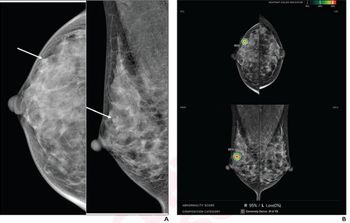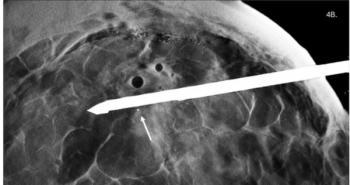
Do Breast Density Reporting Laws Increase Awareness?
Most states require at least some women to receive information about breast density-and that information is leading to more conversations.
State-level density reporting laws help increase breast density awareness, according to a study published in the
Researchers from Connecticut and Washington conducted a national survey to understand the impact of state-level density reporting laws on women’s level of density risk awareness and their engagement in conversations with providers regarding supplemental screening.
The study included survey responses from 1,500 women, aged 40 to 74 years, who obtained a mammogram within the previous two years. The sampling design yielded 300 respondents in each of five groups categorized based on density reporting law features:
- Connecticut (CT group): Law does not require patients be informed of their density category or that density is associated with increased breast cancer risk.
- Everyone, no density (E/ND group): Five states where all women undergoing screening receive information about dense breast tissue. These states do not require that patients be informed of their own density category.
- Only dense (OD group): Sixteen states where only women with dense breasts (category c or d) receive information about dense breast tissue. These state laws specify that density is associated with increased breast cancer risk but do not require that patients be informed of their own density category.
- Everyone, dense breast categories (E/DB group): Nine states where all women undergoing screening receive information about their own density category. Those with dense tissue (category c or d) receive added language that density is associated with increased breast cancer risk and that they consider supplemental screening.
- No-law group: Nineteen states with no density reporting law as of February 2018.
The questions in the survey asked about breast density-related knowledge, the importance of being notified, and sources of information and if conversations with providers regarding density and supplemental screening occurred. Survey results were compared across groups and between women residing in states with versus without density laws.
The results showed that the majority of respondents (85% to 90%) in all groups felt that it is important for women to know their breast density type. Women were most likely informed of breast density type by:
- Health care provider (68% to 72%)
- Mammography result letter (48% to 68%)
- Radiologist (46% to 61%)
Women who were from states that had a density law were significantly more likely to have learned of their breast tissue type from a mammogram results letter (60% versus 48%) and discuss supplemental screening (67% versus 53%) than women from states without a law.
The researchers concluded that state-level density reporting laws are associated with increased breast density awareness and increased likelihood of conversations between women and their providers regarding supplemental screening.
Newsletter
Stay at the forefront of radiology with the Diagnostic Imaging newsletter, delivering the latest news, clinical insights, and imaging advancements for today’s radiologists.














